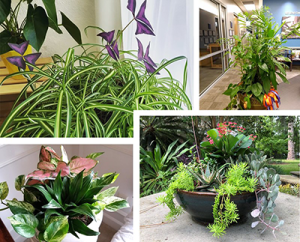It’s getting close to that time of year again! You may be the giver or receiver of a wonderful holiday plant soon. Dish gardens, potted flowering plants (such as azalea, begonia, poinsettia, or chrysanthemum), plants with attractive foliage, and even patio citrus make great gifts. However, special care is needed to keep them healthy throughout the holiday season and beyond!
For plants intended to be “house plants”, over watering, over fertilizing and poor placement are the most common problems encountered by caretakers. The first thing you need to keep in mind about gift plants is that most of them have been growing in a carefully controlled greenhouse environment for some time. These types of plants are acclimated to a specific temperature & humidity level. Therefore, they’re sensitive. When they’re moved into your home atmosphere, they typically go into a level of shock. If you received a gift plant, you’ll have to help it overcome this shock by paying careful attention to the important factors- light, temperature, water, and fertilization.
Indoor areas often restrict light and provide very low humidity. Plants with dense foliage prefer light, but not continuous direct light all day. Placing a plant near a window or near light fixtures should suffice for photosynthesis requirements. However, flowering plants such as mums and poinsettias will stand more light than most foliage plants and should be placed in very bright areas. Most indoor plants grow well in temperatures of 60 to 70 degrees. Be careful to not place plants in drafty locations where sudden changes in temperature occur. Also, don’t place plants close to radiators or air conditioner vents/returns. These areas typically dry soil excessively and could cause plants to wilt.
Watering is one of the major causes of failure with plants in the home, especially for containers which don’t have drainage holes. Most house plants will require a thorough soaking once a week. Water only when necessary and don’t let the pots stand in saucers of water unless the plants are very tolerant to excess water. Overwatering can kill plant roots, increase chances of disease, and eventually kill the entire plant.
Proper fertilization is another important part of growing healthy plants. Fertilizer labeled for house plants or 10-10-10 are good, general-purpose, complete fertilizers to use. Always follow all the directions on the bag or container, so that you don’t over fertilize, causing the plant’s demise.
Following these basic practices to keep house plants healthy should keep your gift plant looking attractive for the remainder of the holiday season and beyond.
For more information on house plants, please visit:
https://gardeningsolutions.ifas.ufl.edu/plants/houseplants/
https://gardeningsolutions.ifas.ufl.edu/plants/houseplants/indoor-gardens/
or contact your local county extension office for more information.
- The Sunshine State is the Perfect Place for Sunflowers - July 20, 2025
- Why Are Sand Dunes & Sea Oats So Important? - March 20, 2025
- How to Care for a Gift Plant - December 5, 2024

